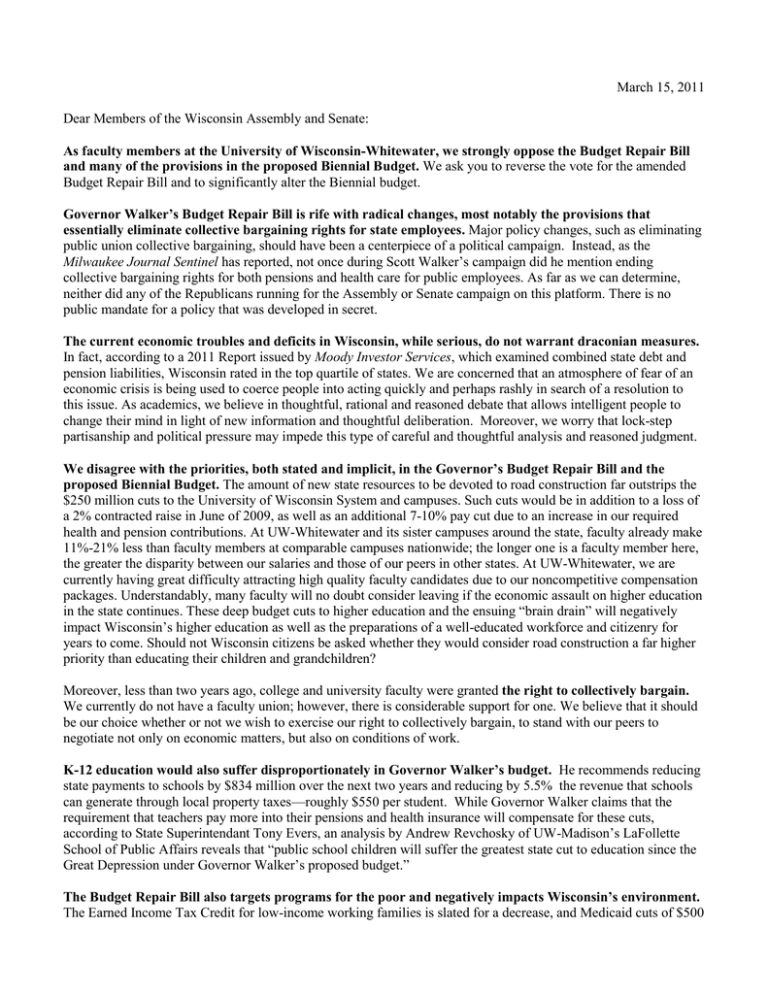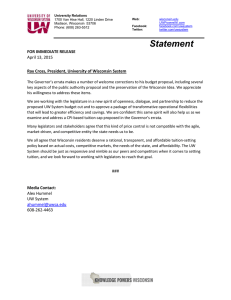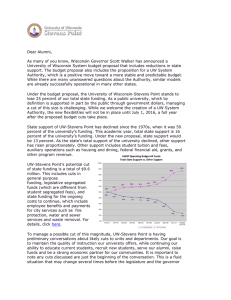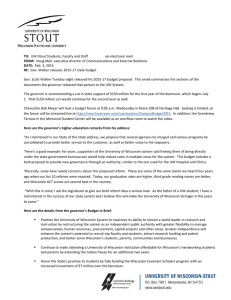Faculty Letter to WI Assembly and Senate
advertisement

March 15, 2011 Dear Members of the Wisconsin Assembly and Senate: As faculty members at the University of Wisconsin-Whitewater, we strongly oppose the Budget Repair Bill and many of the provisions in the proposed Biennial Budget. We ask you to reverse the vote for the amended Budget Repair Bill and to significantly alter the Biennial budget. Governor Walker’s Budget Repair Bill is rife with radical changes, most notably the provisions that essentially eliminate collective bargaining rights for state employees. Major policy changes, such as eliminating public union collective bargaining, should have been a centerpiece of a political campaign. Instead, as the Milwaukee Journal Sentinel has reported, not once during Scott Walker’s campaign did he mention ending collective bargaining rights for both pensions and health care for public employees. As far as we can determine, neither did any of the Republicans running for the Assembly or Senate campaign on this platform. There is no public mandate for a policy that was developed in secret. The current economic troubles and deficits in Wisconsin, while serious, do not warrant draconian measures. In fact, according to a 2011 Report issued by Moody Investor Services, which examined combined state debt and pension liabilities, Wisconsin rated in the top quartile of states. We are concerned that an atmosphere of fear of an economic crisis is being used to coerce people into acting quickly and perhaps rashly in search of a resolution to this issue. As academics, we believe in thoughtful, rational and reasoned debate that allows intelligent people to change their mind in light of new information and thoughtful deliberation. Moreover, we worry that lock-step partisanship and political pressure may impede this type of careful and thoughtful analysis and reasoned judgment. We disagree with the priorities, both stated and implicit, in the Governor’s Budget Repair Bill and the proposed Biennial Budget. The amount of new state resources to be devoted to road construction far outstrips the $250 million cuts to the University of Wisconsin System and campuses. Such cuts would be in addition to a loss of a 2% contracted raise in June of 2009, as well as an additional 7-10% pay cut due to an increase in our required health and pension contributions. At UW-Whitewater and its sister campuses around the state, faculty already make 11%-21% less than faculty members at comparable campuses nationwide; the longer one is a faculty member here, the greater the disparity between our salaries and those of our peers in other states. At UW-Whitewater, we are currently having great difficulty attracting high quality faculty candidates due to our noncompetitive compensation packages. Understandably, many faculty will no doubt consider leaving if the economic assault on higher education in the state continues. These deep budget cuts to higher education and the ensuing “brain drain” will negatively impact Wisconsin’s higher education as well as the preparations of a well-educated workforce and citizenry for years to come. Should not Wisconsin citizens be asked whether they would consider road construction a far higher priority than educating their children and grandchildren? Moreover, less than two years ago, college and university faculty were granted the right to collectively bargain. We currently do not have a faculty union; however, there is considerable support for one. We believe that it should be our choice whether or not we wish to exercise our right to collectively bargain, to stand with our peers to negotiate not only on economic matters, but also on conditions of work. K-12 education would also suffer disproportionately in Governor Walker’s budget. He recommends reducing state payments to schools by $834 million over the next two years and reducing by 5.5% the revenue that schools can generate through local property taxes—roughly $550 per student. While Governor Walker claims that the requirement that teachers pay more into their pensions and health insurance will compensate for these cuts, according to State Superintendant Tony Evers, an analysis by Andrew Revchosky of UW-Madison’s LaFollette School of Public Affairs reveals that “public school children will suffer the greatest state cut to education since the Great Depression under Governor Walker’s proposed budget.” The Budget Repair Bill also targets programs for the poor and negatively impacts Wisconsin’s environment. The Earned Income Tax Credit for low-income working families is slated for a decrease, and Medicaid cuts of $500 million dollars are proposed. The proposed biennial budget eliminates state funding for local recycling programs, reduces protections on the water quality of lakes and streams, and defunds programs to ensure clean and safe drinking water. Mass transit programs, support of alternative energies and energy conservation programs also face drastic cuts. The quality of our natural environment is not only tied to the health, welfare and very identity of Wisconsinites, it is also closely tied to one of our largest industries, tourism. The Budget Repair Bill and Biennial Budget targets the middle class for a disproportionate share of the sacrifice. Only one fiscal tool, namely cuts to programs and services, is being placed on the table. We think that other tools such as taxes and debt restructuring ought to be considered. Public money will be redistributed from essential public services, including education, access to health care and environmental protection to finance even more tax cuts for a privileged minority of businesses. If these proposals pass, real people, including professors, educators, social workers, prison guards and other state employees and public servants will see reduced overall compensation packages, while tax breaks are given to businesses. Such measures will likely thwart economic recovery and will further exacerbate the growing problem of income disparity in the state. These budgetary decisions will have consequences for decades to come. The lack of open and reasoned debate on the proposed changes, and the lack of ability to compromise and to discard ideas are not in the best interest of Wisconsin. Therefore, we urge you to reject the Budget Repair Bill and the Biennial Budget in their current form. Legislators and their constituents have an obligation to examine alternative budget proposals on how to wisely address the state’s budget deficit and at the same time to find ways to move Wisconsin forward. Respectfully, Members of the University of Wisconsin-Whitewater Faculty




